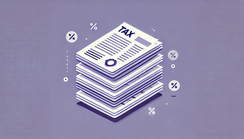How to use Form 4136: Credit for Federal Tax Paid on Fuels

Form 4136 is a valuable tool for businesses that pay federal excise taxes on fuel. By accurately completing this form, you can claim credits that directly reduce your tax liability. This guide will walk you through the essentials of Form 4136, from understanding who qualifies to the step-by-step process of filing the form.
What is Form 4136?
Form 4136, officially titled "Credit for Federal Tax Paid on Fuels," is used to claim credits for federal excise taxes paid on fuel used for certain nontaxable purposes.
It is significant for businesses in industries such as agriculture, transportation, and manufacturing where fuel consumption is high. These credits can reduce your company's overall tax burden by offsetting taxes paid on fuel used in various qualifying activities.
Who qualifies for the fuel tax credit?
Businesses that may benefit from Form 4136 typically include:
- Agricultural operations. Farms that use fuel to power tractors and other farm equipment. These businesses can claim credits for fuel used in the direct production of farm products.
- Transportation companies. Businesses using buses, trucks, or other public or school transportation vehicles can claim credits. This includes both local and long-haul transportation companies.
- Construction companies. Businesses that use fuel for off-highway vehicles and equipment. This includes various equipment used in construction, mining, and other heavy industries.
Types of fuels that are covered
The form covers a range of fuels, including:
- Gasoline. Often used in smaller vehicles and machines.
- Diesel. It is commonly used in trucks, buses, and heavy equipment.
- Kerosene. Used in certain types of heaters and machines.
- Alternative fuels. Such as biodiesel, renewable diesel, liquefied petroleum gas (LPG), compressed natural gas (CNG), and liquefied hydrogen.
Types of credits that are available
Form 4136 offers several tax credits for federal excise taxes paid on fuel. Here are the major credits available:
| Credit type | Description | Who can benefit |
|---|---|---|
| Biodiesel or Renewable Diesel Mixture Credit | Credit for blending biodiesel or renewable diesel with other fuels. | Businesses that produce and use biodiesel or renewable diesel. |
| Alternative Fuel Credit | Credit for the use of alternative fuels such as LPG, CNG, and liquefied hydrogen. | Businesses use alternative fuels in vehicles or machinery. |
| Nontaxable Use of Fuel Credit | Credit for fuel used in nontaxable activities such as off-highway operations, agriculture, and transportation. | Agricultural, construction, and transportation-related businesses. |
| Blending a Diesel-Water Fuel Emulsion Credit | Credit for producing and using or selling diesel-water fuel emulsions to reduce emissions. | Businesses blending diesel with water for emission control. |
| Exporting Dyed Fuels or Gasoline Blendstocks Credit | Credit for export of colored fuels or gasoline blends. | Businesses exporting fuel products internationally. |
| Sustainable Aviation Fuel (SAF) Credit | Credit for the production and use of sustainable aviation fuel to reduce aviation emissions. | Businesses in the aviation industry use sustainable fuels. |
Requirements for the documentation
Proper documentation is important to support your claims and ensure compliance with IRS regulations. The following are essential documentation requirements:
- Keep detailed invoices for all fuel purchases. These should include the date of purchase, type of fuel, amount purchased, and the seller's information.
- Maintain logs that track the usage of fuel. These logs should detail how and where the fuel was used, the type of equipment or vehicles it was used in, and the dates of usage.
- Documentation must prove that the fuel was used in a non-taxable manner. This can include records of the specific activities for which the fuel was used and any relevant operational details.
- For certain credits, such as the biodiesel or renewable diesel mixture credit, businesses may need to provide certification statements that confirm the fuel meets specific standards.
Instructions for completion of Form 4136
- Collect all necessary documentation, including fuel purchase invoices, usage logs, and proof of non-taxable use. Make sure all records are accurate and up to date.
- Obtain the latest version of Form 4136 from the IRS website.
- Enter your name, Taxpayer Identification Number (TIN), and other identifying information at the top of the form.
- Summarize the total credits claimed for all fuel types and uses.
- Enter detailed information for each type of fuel credit claimed, including gallons used and credit amounts.
- Certify the accuracy of your information by signing and dating the form.
- Attach Form 4136 to your annual tax return (Form 1040, 1120, etc.).
- Submit your tax return, including Form 4136 and all supporting documentation, to the IRS.
Impact on tax returns
Reducing tax liability
Claiming credits on Form 4136 effectively reduces the amount of federal excise tax paid on fuel, thereby reducing your overall tax liability. Here's how the credits work:
- Direct reduction of tax due. The credits claimed on Form 4136 are deducted directly from the total tax due, resulting in a dollar-for-dollar reduction. This can result in significant savings, especially for businesses with high fuel consumption.
- Impact on estimated tax payments. Businesses that make quarterly estimated tax payments can adjust their payments to reflect the credits they expect to claim. This helps manage cash flow more effectively throughout the year.
- Carryback and carryforward options. If the credits exceed your tax liability for the year, you may be able to carry back the unused credits to prior tax years or carry them forward to future tax years, depending on IRS rules.
If you have $15,000 in credits but only $10,000 in tax liability, you can carry forward the remaining $5,000 to offset future taxes.
Integration with other tax forms
Form 4136 should be attached to your primary tax return, whether it's Form 1040 for individuals, Form 1120 for corporations, or another appropriate form. The totals from Form 4136 should be reported in the appropriate sections of these forms.
Be sure the fuel purchases and usage reported on Form 4136 agree with the records and amounts reported on other tax forms, such as Schedule C (Business Profit or Loss) or Form 4562 (Depreciation).
Common mistakes to avoid
- Make sure all calculations are correct to avoid incorrect credit amounts.
- Understand fuel categories and ensure purchase records identify the fuel type. Consult IRS publications for accurate classifications.
- Maintain detailed purchase invoices, usage logs, and proof of nontaxable use. Ensure certification statements from suppliers are available when required. Prepare for audits with organized documentation.
Avoid surprise taxes and penalties. Get a tax planning consultation.
Learn moreConclusion
Form 4136 provides valuable opportunities for businesses to reduce their federal tax liability through credits for federal excise taxes paid on fuel. By understanding the eligibility criteria, completing the form accurately, maintaining proper documentation, and staying informed of potential changes, businesses can maximize their tax savings.
Avoid common mistakes such as incorrect calculations, misclassification of fuel types, and lack of proper documentation to ensure your claims are accepted. In addition, staying abreast of potential changes in tax credits and consulting with tax professionals can help you effectively navigate the complexities of the tax code.
By taking advantage of the credits available through Form 4136, businesses can realize significant tax savings and improve their financial health, ultimately supporting growth and sustainability.
For more detailed guidance and the latest updates, always refer to official IRS publications and consult with a CPA or tax advisor.
FAQ
Form 4136 is generally available for download and use at the beginning of the tax filing season each year. The IRS updates the form annually to reflect any changes in tax laws or regulations.
Yes, an individual may file Form 4136 to claim a credit for federal excise taxes paid on fuel, provided the individual meets the eligibility requirements.
Disclaimer: This article is for informational purposes only and does not constitute legal or tax advice. Always consult with a tax professional regarding your specific case.

Ines Zemelman, EA, is the founder and president of TFX, specializing in US corporate, international, and expatriate taxation. With over 30 years of experience, she holds a degree in accounting and an MBA in taxation. See more
Further reading


